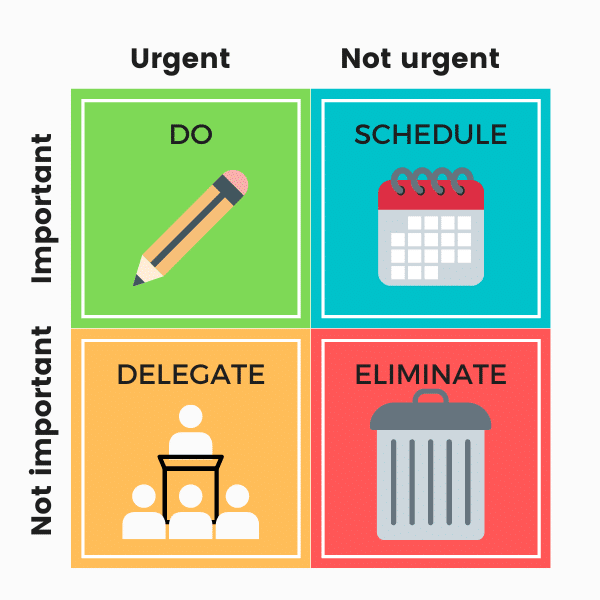9 Practical Time Management Tips That Work

Time management is essential in all aspects of life. For businesses, time management skills help a company make the most out of the available time and improve employee performance.
You can prioritize the important things and achieve goals faster this way. For these reasons, time management tips are essential to take on new opportunities and grow.
Why is Time Management Important?
Everyone’s time is valuable and necessary. Just the thought of not having enough time to get something done can make you stressed. Additionally, poor time management can adversely affect you, your schedule, and your output. It can cause lack of sleep, unhappiness, anxiety, and health complications.
If you don’t understand the importance of time management fully, changing for the better will be a mountain to climb. Some of the reasons why you should prioritize time management include:
Reduced Stress
One of the leading causes of stress is feeling like you are always busy while you cannot complete your work. However, with time management, you have total control of your day-to-day tasks, eliminating stress.
Increased Productivity
A good time manager is always aware of what their day entails. With every available minute accounted for, there is little room for error or exclusions. Those with good control of their time get things done with enhanced focus and efficiency.
Improving Your Work Quality
When you manage your time effectively, it becomes easy for you to space out your tasks. This means that you will allocate enough time for every job, ensuring you accomplish it without rush or procrastination.
Gives You More Time
If you manage your time well, you will just be breezing through your day with ease. In most cases, when you finish your tasks in time, it leaves you with more time for family, friends, and rest.
Helpful Time Management Tips
Below are some of the ways that you can manage your time effectively.
1. Set SMART goals
Most people are likely to find themselves in a situation where they feel like they are doing all it takes but still not improving. The first step towards making this work is by setting SMART goals.
SMART is an acronym that you can use as a guide towards goal setting. It is a way to ensure that we set goals that are clear and achievable within our capacity. The goals should be:
- Specific
When you are setting goals, ensure that they are clear and specific. For example, you should outline what you specifically want to achieve, why you should complete it, and who to involve. You may also include other factors such as the location and resources needed if they make work easier.
- Measurable
You cannot manage what you cannot measure. Measurable goals make it easy for you to track the progress, assess your efforts, and work on what might be slowing you down. It also helps answer questions such as how far you need to go and how you have accomplished the goal?
- Achievable
The time goals that you set should be realistic; it is something that you can achieve by stretching the abilities that you already have?
- Relevant
Does the goal matter to you? What will you gain by waking up earlier than you always do? Your time goal should also align with other plans on your priority list.
- Time-bound
When setting a goal, it is crucial to include a target date. It addresses the day or time you start working on it and what you should be doing each step of the way. For example, when should you start following a specific schedule?
2. Plan effectively
Having a plan plays a pivotal role in achieving time management skills. Every individual needs to plan their time to make the most out of it. There is no point in doing your tasks for the sake of working. With a plan, you will have a sense of direction, giving you the motivation to get done with your assignments on time.
For example, you can set aside a few minutes in the morning to lay out a plan that will guide you through the day. During this session, list down everything you look forward to achieving for the next twenty-four hours.
When you have a detailed plan, it is even easier to pick out the tasks you have to attend to urgently and what you can do later. You can even come up with a task plan to include an activity with its specific time slot.
You can also have the time limits for specific tasks as it will ensure that you neither spend more nor less time on them.
3. Task management
You should also prioritize your tasks from most to least important. This gives you more time to focus on the actual productive activities.
To easily manage your task, you can utilize the Eisenhower Matrix. This simple tool helps you consider the long-term outcomes of daily activities. And it enables you to focus on making your exercise more effective and productive. Visualizing your tasks will have them fall into four different quadrants:
- Urgent and important- do these tasks first.
- Not urgent but important- schedule a time to do them.
- Urgent and unimportant- delegate.
- Not urgent and unimportant- eliminate.

You can also improve your time management using the Pareto Principle. It states that 20% of your activities will account for 80% of your results. In other words, this is not a call to work less but a motivation to work more on the essential tasks—all the while cutting down the effort on the less and unimportant ones.
Finally, try to group similar tasks and complete them in one go if you can.
4. Schedule the most difficult tasks for when you are most productive
Every person has a biological clock known as the circadian rhythm. This clock manages our daily cycles, such as sleeping and waking. This means that your energy levels vary with time.
There are times when you are more productive and others when you are at your lowest productivity level. This can be during the morning, in the afternoon, or even at night. It varies from person to person.
Altering this schedule is not easy. Therefore, the best way to utilize it is by allocating the hardest of tasks when you are most productive.
5. Take frequent breaks
Another important thing while working is taking breaks. When you do a lot of tasks without a break, your motivation and focus reduce. Ensure that you allow some downtime between your jobs so that you can clear your head and refresh. You can take short walks, meditate, take a nap, or chat with friends.
You can also incorporate the Pomodoro technique. This time management method uses a timer to break down your activities with intervals. It promotes sustained concentration without fatigue.
6. Avoid multitasking
Contrary to what most people think, multitasking is not effective. The human brain can only focus on a single task at a time. When you multitask, you are not just doing the tasks simultaneously. You are just rapidly switching jobs.
Multitasking can, therefore, hinder your productivity and performance. When you constantly switch from one task to another, you become less efficient and prone to making mistakes. You divide your attention and become more distracted to focus entirely.
7. Remove all distractions
Distractions are everywhere.
Consider this: When you are entirely focused and immersed in a specific task, it only takes a single push notification from your phone to get distracted from the undertaking. It is not rare to find yourself still on the smartphone fifteen minutes later.
Removing distractions will ensure that nothing sways your attention from the activities. Therefore, you should:
- Turn off alerts from your phone or put the phone away
- Work on an organized space with little or no background noise (if possible)
- Use apps to block distracting websites
8. Track your time with an app
We live in a technology era. One of the easiest ways to keep track of your time is by using a web and cloud based biometric attendance software. They make it easy for you to set time estimates, track your day’s schedule, and maintain the records. By doing so, you will be lifting the burden of manual tracking and making it easy to manage your tasks.
You can also use time management apps that help you monitor your progress. They are accurate and easy to use from the comfort of your phone.
9. Have longer breaks between different tasks
The human brain can only focus for about one and a half hours. This calls for longer breaks to recharge and summon our motivation again.
It would be best if you go for longer breaks, especially after performing a challenging task. A twenty-five-minute break before starting on the next job means that you have enough focus to take you through it.
Summary
Time is a crucial aspect of life that everyone should treat respectfully. Everyone has twenty-four hours in a day. The difference between getting the most out of your day and wasting it all away lies within time management.
With such time management skills, you can make every minute of your day count. When you do it correctly, you will acquire a gratifying skill that will take you far in life, personally and professionally.


